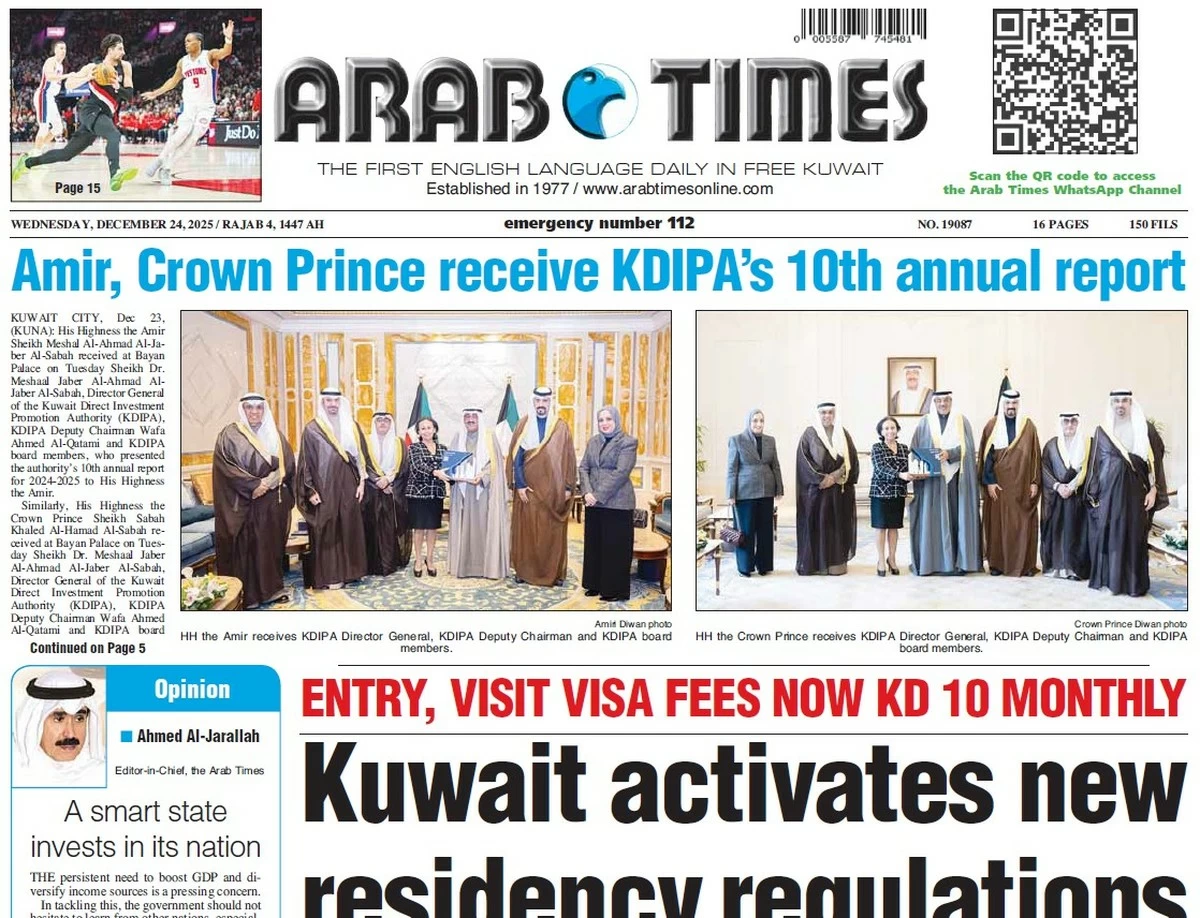10/10/2019
10/10/2019
KUWAIT CITY, Oct 9, (Agencies): Kuwait Direct Investment Promotion Authority (KDIPA) announced Wednesday that Kuwait has advanced by eight places to reach the 46th rank out of 141 countries in the Global Competitiveness Index (GCI) 2019 based on the report issued by World Economic Forum (WEF).
Kuwait also ranked fifth most competitive Arab economy according to the report. According to a KDIPA press release, as compared to its 54th rank in GCI 2018 out of 140 countries.
Kuwait also increased its distance to frontier score by 3 points to reach 65.1 in GCI 2019 up from 62.1 in GCI 2018. Kuwait maintained its top rank in the macroeconomic stability pillar, in the first place, said KIDPA.
It added that Kuwait notably improved its rank in the health pillar (12th rank out of 141 countries in GCI 2019 up from 38th rank out of 140 countries in GCI 2018), in the financial system pillar (34th rank up from 48th rank), and in ICT adoption pillar (37th rank up from 62nd rank).
Out of the 103 components under the 12 GCI pillars in 2019 report, Kuwait witnessed improvement in 45 components, whereas 14 components remained stable, and the report showed no comparable date for seven components that were introduced in this report, with no available date for two components.
Overall, Kuwait improved or stabilized in 9 out of 12 pillars of GCI 2019 that included macroeconomic stability, health, ICT adoption, skills, product market, labor market, financial system, business dynamism, market size. KDIPA reiterated that the improvement in Kuwait position in the GCI 2019 coincided with similar improvement in the Ease of Doing Business Index DB2020.
Kuwait joined, for the first time, the top 20 improvers out of 190 countries according to the initial announcement made earlier by the World Bank Group, awaiting publication of the full report before end of this month. This progress has been attained with the leadership guidance and foresight of His Highness the Amir Sheikh Sabah Al-Ahmad Al-Jaber Al-Sabah and His Highness the Crown Prince Sheikh Nawaf Al-Ahmad Al-Jaber Al- Sabah, said the press release.
The press release also commended the commitment of His Highness the Prime Minister Sheikh Jaber Al-Mubarak Al- Hamad Al-Sabah to improve Kuwait position in international indices, making it at the top priority of the government work program.
The efforts were carried out with full collaboration among the competent government entities, the private sector, and the civil society, to improve business climate and enhance the competitiveness of the national economy in accordance with the National Vision 2035 and its developmental goals.
The United States is less competitive than it was a year ago and the global economy remains hobbled by low productivity despite a decade of cheap money from central banks, the World Economic Forum said Wednesday. In its latest assessment of the factors behind productivity and long-term economic growth, the organization best-known for its annual gathering of the elites in the Swiss ski resort of Davos found Singapore overtaking the United States as the most competitive country, aided in no small part by its state-of-the-art infrastructure and strong cooperation between labor and management.
The Global Competitiveness Report, which is now in its 40th year, said the US is losing ground in measures such as “healthy life expectancy” and preparedness for the future skills needed in the 21st century.
Hong Kong, the Netherlands and Switzerland rounded out the top five places in the rankings. The report’s index maps out the competitive landscape of 141 economies based on more than 100 indicators in a dozen categories. Those categories include headings like health, financial system, market size, business dynamism and capacity to innovate.
The US did remain “an innovation powerhouse” and the world’s most competitive large economy, and despite the prospects of a future skills gap, the US still ranks highly for “ease of finding skilled employees” today. WEF founder Klaus Schwab called the index a “compass for thriving in the new economy where innovation becomes the key factor of competitiveness.”
Authors say it’s too early to fully assess the impact of some of the operative factors in the world economy over the last year, notably rising trade tensions between the US and China that’s led to tariffs on hundreds of billions of dollars’ worth of goods imposed.
They found signs that the trade tiff has led some economies to benefit as businesses look for alternatives to China. “For example, Vietnam used to be at 77 last year. This year, it’s at 67,” said Saadia Zahidi, head of the WEF’s Center for the New Economy and Society.
“That 10-rank increase is in part because the economy has been able to use the current situation in terms of the trade war to attract some of the investments to be able to become a little bit more of a regional trading hub.” Zahidi said there’s not enough information yet to assess the full impact of tariffs on competitiveness, but that the restrictive trade measures appear to be linked to a “downturn in business sentiment” that could bode badly for the global economy


